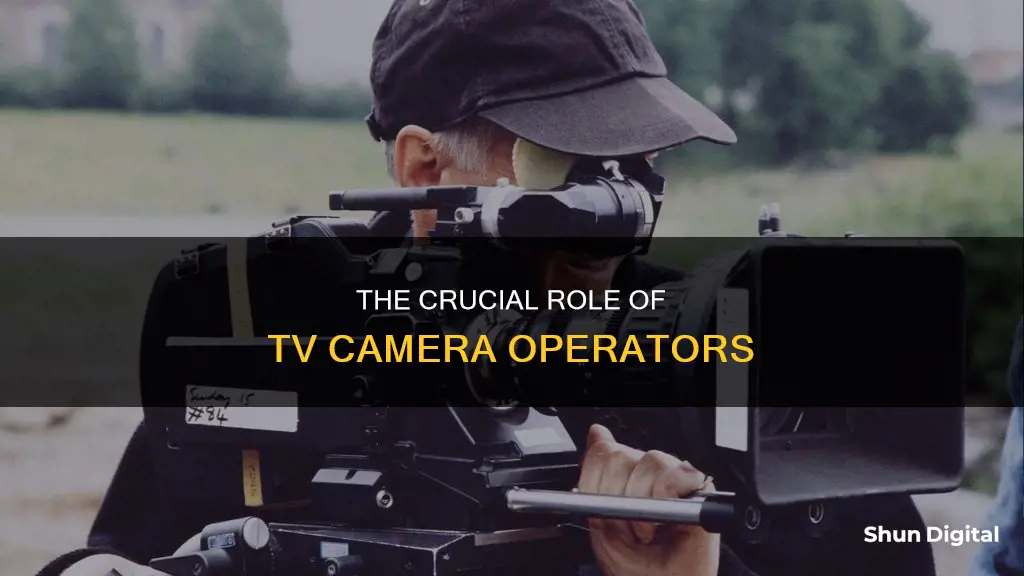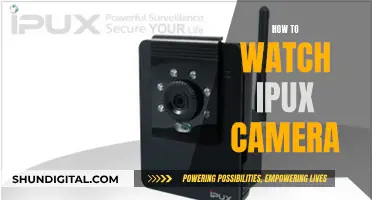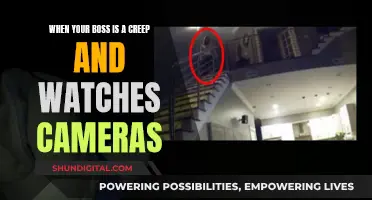
A TV camera operator is responsible for capturing moving images for broadcast television, cable and internet streaming companies. They work on a variety of programmes, including studio or outside broadcasts, television dramas, commercials, documentaries, and news. Camera operators are well-versed in various camera types and equipment, including digital cameras, film cameras, and specialized rigs such as cranes or stabilizers. They collaborate closely with directors, cinematographers, and other crew members to capture the desired shots and angles, ensuring seamless visual continuity throughout the production.
| Characteristics | Values |
|---|---|
| Role | Capture moving images for broadcast television, cable and internet streaming companies |
| Work Environment | Studio or on location |
| Equipment | Digital, electronic and film cameras, tripods, monitors, lighting, cables, leads, headphones, cranes, mobile mountings, etc. |
| Skills | Photography, technical knowledge of cameras, communication, multi-tasking, concentration, interpersonal skills, creativity, patience, etc. |
| Responsibilities | Operating cameras, collaborating with directors and cinematographers, maintaining shot continuity, operating camera support equipment, monitoring technical considerations, adhering to safety procedures, etc. |
What You'll Learn
- Camera operators use a variety of equipment, including single and multiple portable cameras, cranes, and mobile mountings
- They work under a director or director of photography and may be supported by a camera assistant
- They must have a keen eye for detail and an understanding of camera techniques to convey the director's vision
- Camera operators are responsible for capturing the action, considering the composition, framing, and movement of a shot
- It is a physically demanding job, requiring stamina and the ability to stand for long periods

Camera operators use a variety of equipment, including single and multiple portable cameras, cranes, and mobile mountings
Camera operators use a variety of equipment to capture live action for TV, film, commercials and other visual broadcasts. They are responsible for choosing, assembling and setting up the equipment, which can include single and multiple portable cameras, cranes and mobile mountings.
Single and multiple portable cameras are often used in TV, film and video production. Camera operators may work with one or several cameras, depending on the production. Portable cameras are particularly useful for shooting on location, where a camera operator might be required to work in a range of conditions and environments, from underwater to snowstorms or deserts.
Camera operators also use cranes to achieve smooth and dynamic camera movements. Cranes are a type of specialised rig that allows operators to capture shots from a higher vantage point. They can be used to create a sense of scale and grandeur in a scene.
In addition, camera operators make use of mobile mountings, such as pedestals, tripods or handheld rigs, to stabilise and manoeuvre their cameras. Mobile mountings enable operators to capture flowing, steady shots while moving the camera around the studio or set.
The specific equipment used by camera operators depends on the requirements of the production. Camera operators need to be versatile and adaptable, with a strong understanding of various camera types and equipment. They collaborate closely with directors, cinematographers and other crew members to select the most appropriate equipment for each scene, ensuring that the desired shots, angles and visual effects are achieved.
Apple TV Box: Camera Equipped or Not?
You may want to see also

They work under a director or director of photography and may be supported by a camera assistant
TV camera operators work under the direction of a director or director of photography. They are responsible for capturing the action and bringing the director's vision to life on screen. This involves operating a camera during film, television, or video production, and using their technical expertise to achieve the desired shots and angles. They may be supported by a camera assistant, who is responsible for tasks such as loading film, switching out filters, and handling equipment.
Camera operators work closely with the director and cinematographer to understand their creative vision for each scene. They discuss shot requirements, camera angles, and movements, ensuring that the visual style and storytelling goals are met. They offer suggestions based on their technical expertise to enhance the visual impact of the shots.
On multi-camera productions, camera operators work under camera supervisors and receive instructions from the director through headsets. They collaborate with other crew members such as grips and gaffers to ensure smooth camera movements and proper lighting.
Camera operators are also responsible for assembling, preparing, and setting up equipment before filming, including tripods, monitors, lighting, cables, and headphones. They need to have a good understanding of different camera types and equipment, such as digital cameras, film cameras, and specialized rigs like cranes or stabilizers. They must also be able to perform precise camera movements such as panning, tilting, tracking, or zooming to achieve the desired visual composition.
In addition to their technical skills, camera operators need strong communication and collaboration abilities to work effectively with the director, cinematographer, and other crew members. They need to be able to take direction well and work as part of a team. They also need good interpersonal skills to lead and motivate the camera crew.
Uniden Camera Viewing: A Step-by-Step Guide
You may want to see also

They must have a keen eye for detail and an understanding of camera techniques to convey the director's vision
A TV camera operator must have a keen eye for detail and a solid grasp of camera techniques to effectively convey the director's vision. They must be adept at operating a range of camera equipment, including digital, electronic, and film cameras, as well as specialised rigs like cranes or stabilisers.
Camera operators are responsible for executing precise camera movements, such as panning, tilting, tracking, and zooming, to achieve the desired visual composition. They work closely with the director and cinematographer to understand their creative vision and offer suggestions based on their technical expertise. This collaboration ensures that the camera operator's choices in framing, lighting, and camera settings align with the director's vision and enhance the storytelling and visual aesthetics of the production.
To convey the director's vision successfully, camera operators must have a deep understanding of camera techniques and be able to adjust camera settings accordingly. This includes controlling exposure, white balance, and frame rate to ensure optimal image quality. They may also need to use specialised equipment, such as cranes or dollies, to achieve the desired camera movements and angles.
Additionally, camera operators play a crucial role in maintaining shot continuity. They ensure that the camera movements and framing match from one shot to another, creating a seamless visual flow that supports consistent storytelling. This attention to detail and coordination with the director and other crew members is essential for effectively conveying the director's vision.
Camera operators also contribute to the creative process by suggesting shots and providing input on the visual impact of specific shots. They collaborate with the director and cinematographer to ensure that the chosen shots, angles, and movements align with the desired visual style and storytelling goals. This collaborative process allows the camera operator to use their technical expertise to bring the director's vision to life on screen.
Mastering Camera IQ: A Guide to Understanding Your Camera's Settings
You may want to see also

Camera operators are responsible for capturing the action, considering the composition, framing, and movement of a shot
Camera operators are responsible for capturing the action, which requires them to consider the composition, framing, and movement of a shot. They must have a keen eye for detail and a good understanding of camera techniques to effectively convey the director's vision.
Composition
Camera operators must consider the composition of a shot, which involves arranging visual elements within the frame to create a visually appealing image. This includes considering the placement of subjects, the use of leading lines, and the balance of elements within the frame.
Framing
Framing is a critical aspect of a camera operator's job, as it involves deciding what to include and exclude from the shot. They must choose the appropriate lens, camera angle, and distance from the subject to create a well-composed image that conveys the desired message or emotion.
Movement
Camera operators also need to consider the movement of the camera to capture the action effectively. This includes executing precise camera movements such as panning, tilting, tracking, or zooming, ensuring smooth and fluid camera motions that enhance the storytelling and visual aesthetics of the production.
Camera operators play a crucial role in capturing dynamic visuals that enhance the storytelling and visual impact of a production. Their creative and technical choices significantly influence the overall quality and effectiveness of the final product. They work closely with directors, cinematographers, and other crew members to ensure that the desired shots, angles, and visual style are achieved.
In addition to their creative responsibilities, camera operators also have technical duties. They are well-versed in various camera types and equipment, including digital cameras, film cameras, and specialized rigs. They are responsible for setting up, assembling, and maintaining the equipment, ensuring it is in proper working condition and securely mounted or stabilized.
Unexplained: Caught on Camera' Streaming Options Explained
You may want to see also

It is a physically demanding job, requiring stamina and the ability to stand for long periods
Being a TV camera operator is a physically demanding job. It requires stamina and the ability to stand for long periods, as well as the strength to carry heavy equipment. Working hours can be long and unpredictable, typically ranging from 10 to 14 hours a day. This includes evening, weekend, and night shoots. Outside broadcasts, in particular, can be challenging as camera operators are exposed to all weather conditions. Shooting on location can be even more demanding, with extreme environments such as deserts, mountain ranges, or underwater locations.
The physical demands of the job also extend to the need for good hand-eye coordination, as well as excellent hearing and colour vision. Camera operators are responsible for the precise movement of the camera, including panning, tilting, tracking, and zooming, to achieve the desired visual composition. This requires not only technical knowledge but also physical dexterity and stamina.
In addition to the long hours and demanding physical work, camera operators also experience the pressure of working to tight deadlines. Long waits between shots and the need for multiple takes to perfect a scene can be frustrating and tiring. The job often involves travel between locations, further adding to the physical demands.
To meet these challenges, camera operators need to possess not only the technical skills required to operate the camera and associated equipment but also the physical stamina and endurance necessary to withstand the long hours and demanding conditions. They must be able to maintain focus and concentration over extended periods, demonstrating dedication and resilience.
Overall, the role of a TV camera operator is a physically challenging one, requiring a combination of technical proficiency, endurance, and the ability to remain focused and composed under pressure.
Surface Cameras: Watching or Just an Urban Myth?
You may want to see also
Frequently asked questions
A TV camera operator is a professional operator of a film camera or video camera as part of a film crew. They are responsible for operating the camera during film, television, or video production.
A TV camera operator uses cameras and other technical equipment to record moving images for broadcast television, cable, and internet streaming companies. They work with directors, cinematographers, and other members of the production team to capture the desired shots and angles for a scene. They also collaborate with the cinematographer to ensure proper lighting and camera settings.
A TV camera operator needs a range of technical and creative skills, including knowledge of camera equipment and lenses, the ability to frame and compose shots, and perform camera movements. They also need good communication and collaboration skills to work effectively with the production team.
While a degree is not required to become a TV camera operator, technical skills and industry experience are important. You can gain experience through internships, work shadowing, or starting as a camera assistant. Building a network of contacts in the industry is also crucial for finding job opportunities.







